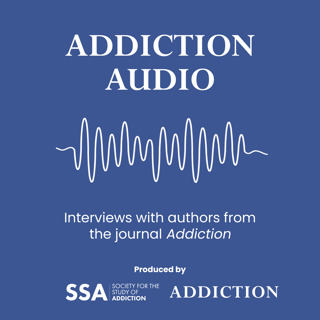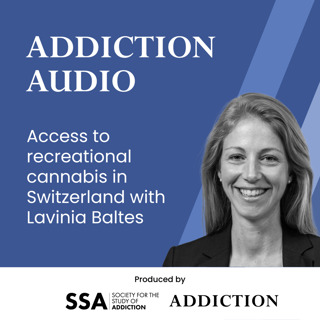
Opioids, cancer and mortality with Aleksi Hamina
In this episode Ben Scher talks to Dr Aleksi Hamina from the Norwegian centre for addiction research at the University of Oslo and the Niuvanniemi Hospital in Finland. They discuss a recent paper co-authored by Dr Hamina in which the team matched large national datasets to identify excess mortality among people who use drugs that can be attributed to cancers. They found increases in incidences and mortality according to liver, lung, larynx and pancreas cancers.They highlight the impact of smoking, alcohol use and hepatitis, and discuss the policy implications of knowing the impact that these issues have on the mortality of people who use drugs. These include ensuring good access to healthcare and reviewing the thresholds for onwards referral when symptoms of cancer are identified. “There is a more than twofold relative increase in cancer mortality in this population”Original article: Increased cancer incidence and mortality among people with opioid use-related disorders: A nation-wide cohort study by Emil Kostovski and colleagues. Published in Addiction (2024). The opinions expressed in this podcast reflect the views of the host and interviewees and do not necessarily represent the opinions or official positions of the SSA or Addiction journal.The SSA does not endorse or guarantee the accuracy of the information in external sources or links and accepts no responsibility or liability for any consequences arising from the use of such information. Hosted on Acast. See acast.com/privacy for more information.
18 Juli 202413min

Cannabis potency and psychotic experiences with Lindsey Hines
In this episode, Dr Rob Calder talks to Dr Lindsey Hines about her study using longitudinal data to examine links between cannabis use, cannabis potency and psychotic experiences. Dr Hines talks about using Avon Longitudinal Study of Parents and Children (ALSPAC) data - also known as 'Children of the Nineties' and discusses why psychosis and cannabis potency are important to measure and some of the challenges of doing so with both."In unregulated markets like the UK where it's illegal to use cannabis....better health messaging and better awareness among those using cannabis of those potential outcomes is the way that we can go".Original article: Incident psychotic experiences following self-reported use of high-potency cannabis: Results from a longitudinal cohort study by Lindsey A. Hines and colleagues. Published in Addiction (2024)Also in this podcast: Testing the validity of national drug surveys: comparison between a general population cohort and household surveys by Hannah Charles and colleagues. Published in Addiction (2021)The opinions expressed in this podcast reflect the views of the host and interviewees and do not necessarily represent the opinions or official positions of the SSA or Addiction journal.The SSA does not endorse or guarantee the accuracy of the information in external sources or links and accepts no responsibility or liability for any consequences arising from the use of such information. Hosted on Acast. See acast.com/privacy for more information.
6 Juni 202425min

Cannabis use in the US with Jonathan Caulkins
In this episode Dr Elle Wadsworth talks to Professor Jonathan Caulkins about self-reported cannabis use in the US between 1979 and 2022 and how those trends compare with alcohol use over the same period. The research focused on four specific time points, measuring cannabis prevalence against US policy changes. Dr Wadsworth and Professor Caulkins then talk about differences between cannabis and alcohol as intoxicants and the impact that cannabis regulations have on cannabis use and the intensity of cannabis use.Professor Caulkins also discusses the limitations of self-report when it comes to substance use, and how this is amplified when asking people about the impact that substance use is having on them and their families. He suggests instead asking people how other people’s substance use is affecting them in order to estimate harms from cannabis use.“Back in 1992 it [cannabis] was essentially a recreational or party drug, sort of a weekend activity and now it has morphed into something that is part of the daily routine for about 40% of its current users.” Original article: Changes in self-reported cannabis use in the United States from 1979 to 2022 by Jonathan Caulkins and colleagues. Published in Addiction (2024)The opinions expressed in this podcast reflect the views of the host and interviewees and do not necessarily represent the opinions or official positions of the SSA or Addiction journal.The SSA does not endorse or guarantee the accuracy of the information in external sources or links and accepts no responsibility or liability for any consequences arising from the use of such information. Hosted on Acast. See acast.com/privacy for more information.
22 Maj 202422min

Integrated care vans with Kathleen Page
In this episode, Ben Scher talks to Dr Kathleen Page about her evaluation of an integrated care van that ran in Baltimore offering healthcare interventions and buprenorphine prescribing. Dr Page discusses using a cluster randomised trial to compare outcomes in different neighbourhoods (those where the van did and didn't go) and to explore whether the van was effective at improving health outcomes for people who inject drugs.Dr Page also talks about the impact of COVID-19 on the research as well as the specific needs of people who accessed the van."When you go out on the van you really are serving a different group, a much more under-served group of people who generally mistrust or don't access the health system unless it's an emergency."Original article: Integrated care van delivery of evidence-based services for people who inject drugs: A cluster-randomized trial by Kathleen Page and colleagues. Published in Addiction (2024)The opinions expressed in this podcast reflect the views of the host and interviewees and do not necessarily represent the opinions or official positions of the SSA or Addiction journal.The SSA does not endorse or guarantee the accuracy of the information in external sources or links and accepts no responsibility or liability for any consequences arising from the use of such information. Hosted on Acast. See acast.com/privacy for more information.
9 Maj 202426min

Smoking and abdominal obesity with Germán Carrasquilla
In this episode Rob Calder talks to Dr Germán Carrasquilla about his study assessing whether smoking cased increases in abdominal obesity or belly fat. They discuss the implications of this kind of fat and note the importance of the findings for people who struggle to quit smoking. Germán talks about using Mendelian randomisation to identify a causal association between smoking and abdominal obesity. The findings, that 'smoking initiation and higher lifetime smoking may lead to increased abdominal fat', add evidence and important detail to the known health benefits of quitting smoking."People who might be afraid of quitting smoking due to putting on weight find these findings motivating to quit smoking because smoking increases this problematic internal fat which is a risk factor for many other diseases like diabetes, cardiovascular disease."Original article: Estimating causality between smoking and abdominal obesity by Mendelian randomization by Germán Carrasquilla and colleagues. Published in Addiction (2024)The opinions expressed in this podcast reflect the views of the host and interviewees and do not necessarily represent the opinions or official positions of the SSA or Addiction journal.The SSA does not endorse or guarantee the accuracy of the information in external sources or links and accepts no responsibility or liability for any consequences arising from the use of such information. Hosted on Acast. See acast.com/privacy for more information.
2 Maj 202417min

Benzodiazepines and treatment with Adam Bakker, Michael Liebrenz and Alexander Smith
In this episode Ben Scher talks to Dr Adam Bakker, Professor Michael Liebrenz and Dr Alexander Smith about their commentary in response to a previous paper by Domzaridou and colleages (2023). They discuss the complexities of providing treatment for people who use, and are prescribed, opiates, opiate agonist medications and benzodiazepines. They talk about using a combination of medical and non-medical treatments when working with people who use benzodiazepines as well as the research needed to bring clarity to this pressing clinical issue."This population is notoriously difficult to engage, but we should go the extra mile to retain them in treatment because of this high mortality."Original Article: Comment on Domzaridou et al.: Recognising the complexities of co-prescriptions and lifestyle factors in opioid agonist treatment by Adam Bakker and colleagues. Published in Addiction (2024).The opinions expressed in this podcast reflect the views of the host and interviewees and do not necessarily represent the opinions or official positions of the SSA or Addiction journal.The SSA does not endorse or guarantee the accuracy of the information in external sources or links and accepts no responsibility or liability for any consequences arising from the use of such information. Hosted on Acast. See acast.com/privacy for more information.
25 Apr 202423min

Contingency management with Gabriela Khazanov, James, McKay and Richard Rawson
In this episode, Ben Scher talks to Dr Gabriela Khazanov, Professor James McKay and Professor Richard Rawson. They discuss what contingency management is and how effective it can be in treatment settings. They also talk about how contingency management can be used for stimulant use disorders; an area where there are relatively few evidence-based treatments.the team goes on to discuss implementation of contingency management in the US and the barriers faced by practitioners such as predominant ethical concerns. They also cover how attitudes towards contingency management have changed over the past decade. The paper that was published in Addiction looked at ways to improve dissemination and implementation of contingency management.Often patients are not able to re-engage in contingency management if they drop out or they’re not allowed to repeat contingency management. And all of that was done to prevent fraud and waste and those kinds of concerns. But we don’t limit other kinds of treatment. We don’t limit behavioural therapy, typically we don’t limit the ability to take medications that could potentially be effective. Original article: Should contingency management protocols and dissemination practices be modified to accommodate rising stimulant use and harm reduction frameworks? by Gabriele Khazanov and colleagues. Published in Addiction (2024). The opinions expressed in this podcast reflect the views of the host and interviewees and do not necessarily represent the opinions or official positions of the SSA or Addiction journal.The SSA does not endorse or guarantee the accuracy of the information in external sources or links and accepts no responsibility or liability for any consequences arising from the use of such information. Hosted on Acast. See acast.com/privacy for more information.
17 Apr 202427min

Xylazine, heroin and drug markets with Caroline Copeland
In this episode Ben Scher talks to Dr Caroline Copeland about her work analysing drug death data to identify drug use trends, harms and to inform policy. Caroline talks about how xylazine first entered the US drug market but has been increasingly identified in Europe and the UK, even being identified in vapes sold as containing tetrahydrocannabinol (THC). Caroline covers the harms from xylazine and the implications for public health practitioners before relating the UK issues to wider global drug markets."The other really nasty thing that xylazine does is that it can cause blood vessels to contract, and our tissues need blood.....to survive, and if we're closing off those blood vessels, that tissue is going to die and it's going to turn into sores on your skin. And if they get infected it can lead to amputation"Dr Caroline Copeland is a senior lecturer in pharmacology and toxicology at King’s College London and the director of the National Programme on Substance Use Mortality.Original article: Broad evidence of xylazine in the UK illicit drug market beyond heroin supplies, triangulating from toxicology, drug testing and law enforcement by Caroline Copeland and colleagues. Published in Addiction (2024)The opinions expressed in this podcast reflect the views of the host and interviewees and do not necessarily represent the opinions or official positions of the SSA or Addiction journal.The SSA does not endorse or guarantee the accuracy of the information in external sources or links and accepts no responsibility or liability for any consequences arising from the use of such information. Hosted on Acast. See acast.com/privacy for more information.
9 Apr 202420min





















